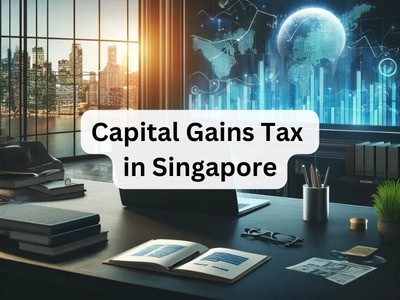This post is also available in:
简体中文 (Chinese (Simplified))
Capital Gains Tax in Singapore

Singapore has no capital gains tax for most cases.
In Singapore, the sales of shares, fixed assets, intangible assets, gains on foreign exchange on capital transactions etc. are generally not taxable. Capital gains are only taxable if you are the dealer or trader – that means the gains are taxable if a person buys and sells property with a profit-making purpose.
From 1 January 2024, certain gains from the sale or disposal of foreign assets by an entity of a relevant group may be treated as taxable income when received in Singapore if the entity does not have adequate economic substance in Singapore. A group is a relevant group if the entities of the group are not all incorporated, registered or established in Singapore or any entity of the group has a place of business outside Singapore. Foreign-sourced disposal gains from the sale or disposal of a foreign asset (excluding intellectual property rights) will not be treated as taxable income in Singapore if the entity has adequate economic substance in Singapore. Economic substance will be assessed based on factors such as operations, human resources and premises. Losses arising from such transactions may be carried forward but can only be offset against foreign-sourced disposal gains that are subject to tax.
How to determine the nature of income if he or she is trading in capital assets?
Although currently there is no guidance that clearly spells out the characterization of such proceeds (whether to consider it as tax-free capital gains or taxable trading income), the profits will be taxed as income earned if they are of the trade or business activities in Singapore, according to IRAS’s definition.
Below are the key considerations to determine if the selling/buying of properties are of profit-making purpose:
- The frequency of acquiring and selling of properties;
- The purpose/reason for buying and selling of property;
- The financial means to hold the property for long-term; and
- What is the holding period (the holding period is calculated from the day the capital asset is purchased until the date it is being sold)
The “Safe Harbour” Rule
Applicable to disposals of ordinary shares made from 1 June 2012 to 31 May 2022, the “safe harbour rule” exempts the disposal of equity investments and share disposal gains from tax if the following criteria are fulfilled:
- The divesting company holds at least 20% of the ordinary shares in the company (whose shares are being disposed of); and
- The divesting company holds at least 20% shareholding for at least 24 months before the disposal.
That said, if the conditions/requirements are not met, the tax treatment of the gains/losses due to share disposals will be determined based on consideration of the facts and circumstances of the case.
Long story short, the strategic advantage of zero capital gains tax in Singapore is huge – it is an important COG that encourages investment in the country. While higher capital gains taxes will drain cash out of the investment cycle, low or no capital gains tax will do the opposite – zero capital gains tax is one of the reasons that will give share prices a boost, increase investment and encourages entrepreneurship to register company in Singapore and start their business.


